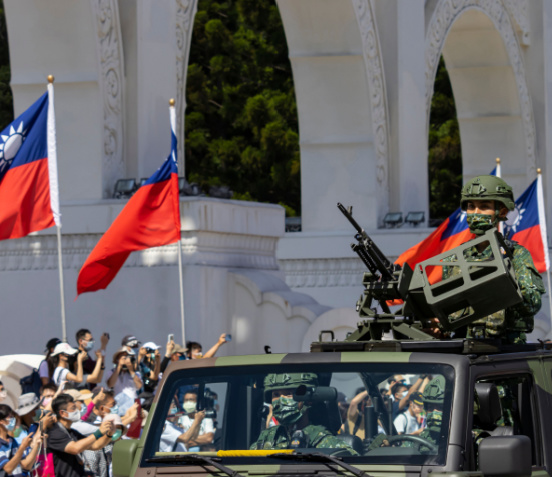It was 68 years ago this week that Congressional influence on America’s Taiwan policy was born amid the rubble of the Truman Administration’s China policy. The moment arrived as Generalissimo Chiang Kai-shek’s silver, four-engine Douglas C-54 Skymaster roared off the runway from Chengdu on December 10, 1949, bundling him off to permanent exile in Taipei. At once, the United States Congress became the single most important factor in executive branch considerations of Taiwan policy; though sometimes negative, for the most part Congressional involvement was constructive and mercifully nonpartisan.
This first year of the Trump Administration has seen democratic Taiwan sustaining its supremely positive image on Capitol Hill. By contrast, Congress contemplates “the peaceful rise” of Taiwan’s nemesis, China, as it might welcome Godzilla’s “peaceful rise” from the waters of the Pacific.
Indeed, Congress regards Taiwan as America’s most successful partner democracy in Asia. Less publicized is Capitol Hill’s view of Taiwan as an American “security cooperation partner”—perhaps “the United States’ largest security cooperation partner in Asia”—a reputation that a year ago captured the president-elect’s imagination.
On December 2, 2016, Donald Trump engaged in a cordial and unprecedented phone call with Taiwan’s president, Tsai Ing-wen (it was the first direct contact of any kind between an elected US president and a Taiwan leader since President Eisenhower visited Taipei in 1960). Horror spread throughout the professional foreign policy class and technicolor explosions of the Beltway’s commentariat ensued. Mr. Trump then tweeted his eminently reasonable opinion: “Interesting how the US sells Taiwan billions of dollars of military equipment but I should not accept a congratulatory call.” Of course, over the seven years preceding the Trump-Tsai phone call, the executive branch had “notified Congress of more than $14 billion in arms sales.” Unlike most American pundits, the president-elect had an unnuanced, down-to-earth appreciation of what a fine “security cooperation partner” Taiwan was.
Congress’s role commenced shortly thereafter. In mid-January, Secretary of State-designate Rex Tillerson found multiple briefing pages of nice things to say about Taiwan in his confirmation colloquies with the Senate Foreign Relations committee. And, while Mr. Tillerson wasn’t wholly attentive to the arcana of Taiwan relations (Mr. Tillerson garbled President Reagan’s “Six Assurances” into the “Six Issues Accord”), he was tough on China and its aggressiveness in the South China Sea—so tough that Beijing’s newspapers asked “Is Tillerson’s bluster just a bluff for Senate?”
Beijing is very tetchy when it comes to Capitol Hill’s warm regard for Taiwan, particularly because the Taiwanese-American community has been effective in mobilizing lawmakers’ influence. The Congressional Taiwan Caucus and Senate Taiwan Caucus, established in 2002 and 2003, have grown into the largest country-based Congressional caucus (220 members as of September 2017) and second largest Senate caucus (31 members, second only to the Senate India Caucus founded by Hillary Clinton). This level of involvement reflects an astounding depth of bipartisan Hill support enjoyed by Taiwan.
Throughout 2017, Capitol Hill sensed a new White House friendliness toward Taiwan, but President Trump’s deal-making, “transactional” approaches to Beijing on trade, maritime freedoms and North Korea were unsettling. Prior to the Trump-Xi Jinping summit at Mar-a-Lago, 147 members of the Congressional Taiwan Caucus wrote respectfully to the President on April 5, 2017 to “ensure that the United States continues to adhere to the Taiwan Relations Act and the Six Assurances.” On June 15, the Republican-chaired Asia subcommittee of the House Foreign Affairs Committee held hearings because of worries that the “administration has inadvertently added to the confusion with mixed messages in the complex area of Taiwan policy.”
Prominent members of both chambers introduced legislation encouraging broader US official interactions with Taiwan’s government, acts variously called the “Taiwan Travel Act” and the “Taiwan Security Act.” Generally, these high-minded bills were feints to slip more subtle and substantive improvements on US-Taiwan military exchanges and technical “debundling” of Taiwan defense sales notifications (Sections 1259 and 1270) into a [semi veto-proof] National Defense Authorization Act of 2018 Conference Report. Which is a jargon-laden way of saying, “Congress insists that Taiwan be managed as a normal US security cooperation partner in Asia.”
In past administrations, Congress tried to nudge the White House toward a more accommodating posture on the US-Taiwan security relationship, only to be met with stouthearted resistance at the National Security Council and the State Department. By contrast, Trump Administration nominees to key Asia positions have long paper trails of scholarly analyses and op-eds that reflect an eagerness to deepen US-Taiwan defense cooperation.
One such nominee, Randall Schriver, a former deputy assistant secretary of state for East Asian and Pacific affairs, has written extensively on Taiwan security issues for his Project 2049 Institute think tank in Arlington, Virginia. On June 23, 2017, eight senators, in an impressive bipartisan national security leadership coalition of four Republicans and four Democrats, adopted his think tank’s recommendations and urged President Trump, in writing, to:
- release pending Taiwan arms sales programs currently awaiting Congressional notification;
- end the practice of “bundling” Taiwan arms sales, and instead establish a regular and routine process whereby notifications would be sent to Congress when ready;
- and quickly and robustly address Taiwan’s significant and legitimate future requirements for new defense capabilities.[1]
These senators cautioned the President against allowing concerns about China to take precedence over support for Taiwan. They also warned that, “China has intensified its economic coercion and military intimidation tactics, thereby stoking cross-Strait tensions and threatening peace and security in the Taiwan Strait. Given these circumstances, our support for Taiwan is more important than ever.”
On June 30, after five months of weighing China’s meager contributions to the denuclearization of North Korea, the Trump Administration notified Congress of another $1.3 billion in sales to Taiwan.[2]
The Senators’ June 2017 letter to President Trump was only the most visible evidence of the Legislative Branch’s influence on US-Taiwan relations in the first year of the Trump Presidency.
By August, Congress’s unabashed promotion of close ties with Taiwan became too much for Beijing. Chinese Ambassador in Washington, Cui Tiankai (崔天凱), sent formal letters to top House and Senate leaders averring that the Taiwan Travel Act, the Taiwan Security Act and Taiwan provisions in the Defense budget were “provocations against China’s sovereignty, national unity and security interests” and “crossed the ‘red line’ on the stability of the China-US relationship.” It is unclear just what the Chinese ambassador was complaining about. Apparently, most assumed China objected to the bills in principle, but one commentator seemed to think it was because a Senate amendment “mandated” US Navy port calls in Taiwan. Perhaps it was the ambassador’s clever stratagem to take credit for something that was going to happen anyway; all along, the “mandate” language was drafted to be softened in conference, and Ambassador Cui can claim credit that his tough talk cowed the Congress.
Capitol Hill’s most direct influence on foreign and defense policy is in the Senate and its advice and consent role, so it is instructive that the president and his team seem to welcome Congressional input—on Taiwan, at least. The Defense Department seems open as well, given the subcabinet nominations of several appointees with solid Congressional experience. Whether the Department of State is as welcoming is less evident, given the vacuum of nominees for State’s Asia policy posts.
Assistant Secretary of Defense-designate Randall Schriver must have carefully studied the June 23rd letter from the eight key senators. He told his Senate confirmation hearing in November that “I believe the US Government should improve the predictability of arms sales to Taiwan by encouraging Taiwan to submit formal requests for defense articles and services, then responding to those formal requests in a timely fashion.” And when asked about the controversial matter of resuming US Navy “port calls” to Taiwan (after 40 years), he responded:
I have been on the record in published articles supporting both US Navy ship visits to Taiwan, as well as Taiwan navy ship visits to the United States. Such port calls would be entirely consistent with our One China Policy as we define it. … Since we reserve for ourselves the right to define our own One China Policy, commencing US ship visits to Taiwan and vice versa can be included. The benefits of US port calls to Taiwan would fall into the traditional justification for port calls to any other friendly country in the world […]; and to support our political goals of supporting Taiwan and deterring China. [….]
“In foreign policy, Congress proposes and the President disposes”—this is the core Constitutional demarcation of prerogatives. House and Senate committees can hear witnesses, give members of Congress podiums for pontification, and send any number of bills to the floor for votes, but they cannot constitutionally mandate any foreign policy upon an unwilling president, unless, of course, it requires a lot of money. And it is equally difficult, despite such efforts to make it more so as the War Powers Act, to restrain a president from plowing into a policy that the Congress does not want. So it is significant that the President’s nominees on Taiwan policy issues are long-time Asia experts with track records of China-skepticism.
On the whole, Congress over the past ten months has been remarkably supportive of Taiwan and of the Trump Administration’s new directions in its relations with Taiwan.
That said, Congressional views of Taiwan are not all sweetness and roses. One must admit that major US trade interests have their beef with Taipei, including the US National Pork Producers Council (NPPC), Qualcomm, and even ride-share behemoth Uber. And there is surliness in Congress over Taiwan Mega Bank’s lax attention to money laundering. Even members of Congress who generally support Taiwan are lukewarm with regard to Taiwan’s hopes for movement on the “Trade and Investment Framework Agreement” (TIFA) and are less supportive of a separate US-Taiwan bilateral free trade agreement (FTA).
Sixty-eight years ago, Congress slammed the Truman Administration by asking the electorate “Who Lost China?” Taiwan had become a partisan issue, with the Republicans demanding strong US military support for the Island, while the Democrats pointed to the corruption and embezzlement of Chiang’s defeated regime. The outbreak of the Korean War in June 1950 tipped the debate decisively in Chiang’s favor and the impact five months later on the US midterm elections was strong, with Republicans winning 28 House seats and another 5 in the Senate. But since the Eisenhower administration, Congress has engaged with Taiwan in largely constructive and bipartisan ways.
The main point: On the whole, Congress over the past ten months has been remarkably supportive of Taiwan and of the Trump Administration’s new directions in its relations with Taiwan. How US-Taiwan relations, as well as US-China relations, will develop as the Trump presidency unfolds remains to be seen. Thus far, 2017 has been a year of constructive, bipartisan Congressional-Executive support for Taiwan. Despite Congress’s discomfort with the President’s “transactional” approach to Taiwan policy, 2018 may be a year that a “transactional” approach brings dramatic changes to executive branch management of the Taiwan-China balance.
[1] Coalition members included Senators Benjamin Cardin (D-MD) ranking member of the Senate Foreign Relations Committee (SFRC), John Cornyn (R-TX) Senate Majority Whip, James Inhofe (R-OK), Edward Markey (D-MA) ranking minority member of the SFRC subcommittee on East Asia, John McCain (R-AZ) Chairman of the Senate Armed Services Committee, Robert Menendez (D-NJ) former SFRC Chair, Marco Rubio (R-FL) chair of the Senate committee on Commerce, and Ron Wyden (D-OR) ranking minority member of the Committee on Finance. See https://www.ustaiwandefense.com/us-senators-urge-president-trump-to-support-taiwan-self-defense-capabilities/
[2] Christopher Nelson, The Nelson Report (June 30, 2017), email newsletter sent to the author. The June 30, 2017 Nelson report cited an official “background brief,” attributable to a “US Government official,” which read: “This afternoon, the Department of State approved and delivered Congressional notifications for several sales to Taiwan cumulatively valued at approximately $1.4 billion. The notifications from DSCA are attached.
Systems include:
- Early Warning Radar Surveillance Technical Support ($400 million)
- AGM-154C Joint Stand-off Weapon (JSOW) ($185.5 million)
- AGM-88 High-Speed Anti-Radiation (HARM) Missiles ($147.5 million)
- MK 48 6AT Heavy Weight Torpedoes ($250 million)
- MK 46 to MK-54 Torpedo Upgrade ($175 million)
- SM-2 Missile Components ($125 million)
- AN/SLQ-32A Electronic Warfare (EW) Shipboard Suite Upgrade ($80 million)




